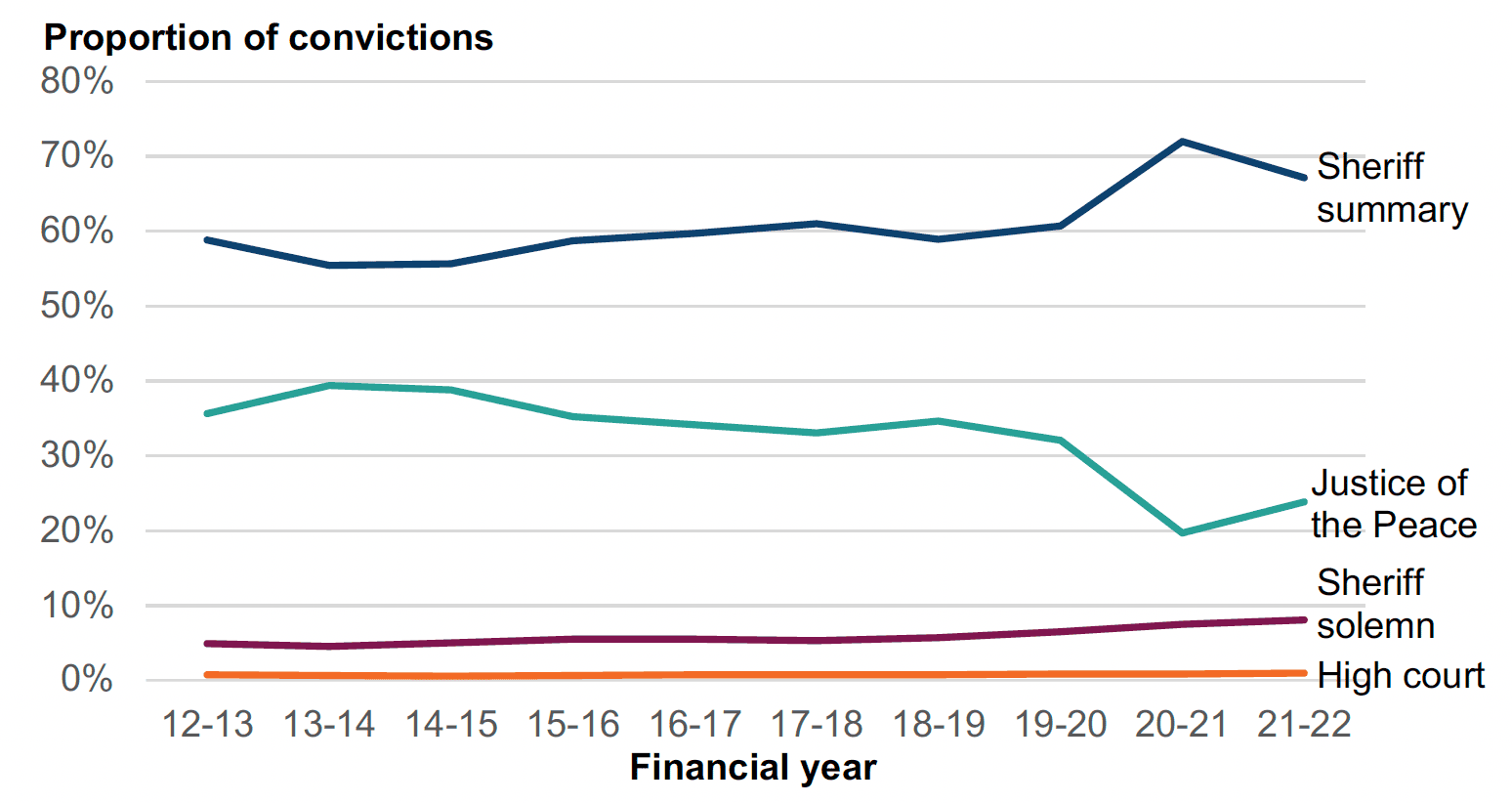Criminal Proceedings in Scotland, 2021-22 – Updated
Statistics on criminal proceedings concluded in Scottish courts and alternative measures to prosecution issued by the police and the Crown Office and Procurator Fiscal Service are presented for the 10 years from 2012-13 to 2021-22. The latest two years of data were impacted by the COVID-19 pandemic.
4. People convicted in court
(Table 3)
There are four main court types that deal with criminal cases in Scotland.
- The High Court, which deals with the most serious crimes such as murder, rape and armed robbery. Murder convictions carry a mandatory life sentence and the maximum penalty that may be imposed in the other cases is up to life imprisonment and/or an unlimited fine. The exact maximum in a given case will be determined by any limit provided for in law for the offences being prosecuted. A single judge hears cases with a jury of 15 people. The jury reach a verdict, and if a conviction arises, the judge determines sentence.
- Sheriff Courts, which deal with the majority of cases in Scotland. These can either be solemn, where the Sheriff sits with a jury of 15 people or summary, where the Sheriff sits alone [note 1]. For solemn cases, the jury reaches a verdict and, if a conviction arises, the Sheriff determines sentence. The maximum penalty for solemn cases is five years’ imprisonment and/or an unlimited fine. For summary cases, the Sheriff reaches a verdict and, if a conviction arises, determines the sentence. The maximum penalty that may be imposed (in most circumstances [note 2]) is one year’s imprisonment and/or a £10,000 fine.
- The Justice of the Peace courts. These deal with the less serious crimes, such as speeding, shoplifting and certain types of breach of the peace. They are chaired by a Justice of the Peace or “lay magistrate” who has been appointed from the local community and trained in criminal law and procedure. They can impose custodial sentences of up to 60 days and fines up to £2,500.
Chart 4 shows the changes in the proportion of convictions seen in each court type since 2012-13. Sheriff Solemn courts have risen from 5% of all convictions in 2012-13 to 8% in 2021-22. This increase in the proportion of more serious convictions is likely to be partly responsible for the increase in sentence lengths since 2012-13. The proportion of convictions in Sheriff Summary courts increased the most of any court type (by eight percentage points). The increase in the proportion of convictions in the Sheriff Summary courts is mostly due to decreases in the numbers seen in the Justice of the Peace courts. The proportion of cases seen in High Court has been broadly steady over the last decade, holding at 1%.
The proportion of convictions seen in Sheriff Summary courts has decreased by five percentage points between 2020-21 (72%) and 2021-22 (67%).
Justice of the Peace courts accounted for 24% of convictions in 2021-22 compared to 20% in 2020-21.
The number of convictions in Justice of the Peace courts has risen by 69% from 8,385 in 2020-21 to 14,134 in 2021-22. The long-term fall in numbers of convictions in the Justice of the Peace courts reflects decreases in the number of proceedings for Road traffic offences, which the Justice of the Peace courts tend to deal with.
Convictions in Sheriff Summary courts rose by 30% from 30,675 in 2020-21 to 39,817 in 2021-22. This follows a general downward trend in Sheriff Summary convictions since 2012-13 when there were 59,410.
The number of convictions in Sheriff Solemn courts increased by 50% from 3,179 in 2020-21 to 4,778 convictions in 2021-22.
The number of High Court convictions increased by 51% in 2021-22 to 566 convictions (from 375 in 2020-21). Please note that recording delays are typical for High Court activity due to the complex nature of cases held there. As a result, the total number of High Court convictions for 2021-22 may be slightly underestimated, and will likely be revised upwards in the 2022-23 bulletin. More information is available in the Annex revisions section.
Notes for Section 4. People convicted in court
Note 1. In a Sheriff Solemn court, the jury determines whether an accused is guilty or not and the Sheriff determines sentence. In a Sheriff Summary court, the Sheriff determines both whether an accused is guilty or not and, if guilty, the sentence.
Note 2. The court can sentence up to an additional six months where there is a bail aggravation on the charge, and Sheriff Court fines can be higher than £10,000 where there is legislative provision for this in relation to a specific offence.

Contact
Email: justice_analysts@gov.scot
There is a problem
Thanks for your feedback